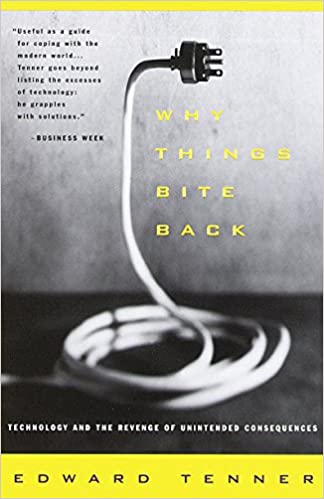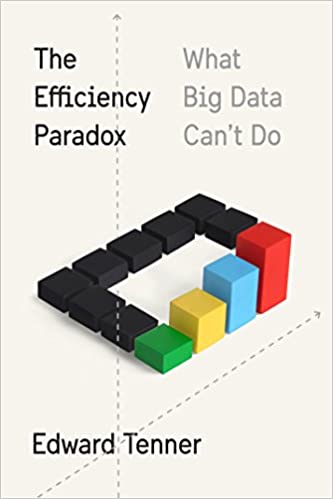Edward Tenner – Why Things Bite Back Audiobook
Edward Tenner – Why Things Bite Back Audiobook (Innovation and the Vengeance of Unintended Outcome Vintage)

Why Things Bite Back Audiobook
his publication might be a bit dated as it does not cover any sort of 21st Century innovation, yet it is an exceptional evaluation of the unexpected impacts that took place from numerous contemporary innovations up that aspect. A lot of completion outcomes are points we are all educated about, some great and some unfavorable, yet all substantial. What a fantastic book! Edward Tenner’s assessment of why technical improvement in some way never ever appears to get us anywhere ought to need to be far far better recognized than it is. Tenner’s writing is vibrant and likewise his tales remarkable.
Stage 9, on how the electronic work environment in some method has actually never ever brought the excellent restorations in performance that were anticipated for it, deserves the rate of the book by itself. I work throughout the day on a computer system. Why Things Bite Back Audiobook Free. The programs I handle have some wonderful characteristics. Yet, insects are all over the location. My workplace just recently updated to a brand name- brand-new variation of our word processing program, so computer system efficiency exacerbated significantly. This has really been my experience with most of upgrades. Tenner discusses that computerizing a treatment is no guarantee that it will work much better. I actually liked Tenner’s description of simply how mistakes insinuate, and the frequently- neglected requirement for severe upkeep to keep computer system systems working usefully.
Tenner bears in mind that in the routine business, computer systems do make it possible for some staff members to be release. Unfortunately, in a lot of cases the cost savings are stabilized by the cost of the devices and the need to use expensive service technicians to maintain the computer system systems. I definitely concur. Tenner does not discuss utilizing computer systems in education and knowing. My experience with my 10- year- old kid’s college is that computer systems for schoolchildren are a significant drain on organization resources, with little or no finding out to reveal for it.
I valued the area on the “revenge impacts” of the automobile. Tenner includes a quote to the result that when you count the time invested driving and include on the work time required to invest for the vehicles and truck itself and for gas, insurance coverage, and so on, the real rate accomplished is hardly ever faster than a strolling rate. When the auto at first went into substantial use in the UNITED STATE, it was discovered that the roads rapidly blocked. Ever since we have actually gotten on a constant round of structure a lot more roads, which after that block, needing more roads, which then crowd, and so on in addition to on. Tenner missed out on a substantial factor to this procedure: absolutely free parking area, which mimics a fertility drug for vehicles. For far more on this, see Donald Shoup’s book “The High Rate of Free Automobile Parking.” The High Rate of Free Automobile parking I similarly heartily encourage James Howard Kunstler’s book “The Place of No location.” Location of No Place: The Increase and likewise Reduction of America’s Male- Made Landscape.
Tenner’s book is a bit outdated in areas; nevertheless, it is undue to enable that stop you from reading it. Considered that I had really read on the topic of innovation, complexity, choice making etc, I chose to act on a few of the resources I had actually encountered in my numerous other analysis. I selected Inviting Catastrophe, by James R. Chiles, (an extra Minnesotan), Why Things Attack Back by Edward Tenner, and Regular Mishaps by Charles Perrow. I furthermore decided to examine them together, although I have really similarly examined the latter separately.
The Chiles book Welcoming Disaster is totally amusing. The author is an expert author with an easy to understand style that generally experiments with gadgets, goes on site, or supports service technicians in order to do his research study. Edward Tenner -Why Things Bite Back Audio Book Online He is never ever provided to merely armchair research study which develops an incredibly remarkable story.
I did have some issue getting made use of to his method of pairing current and likewise 19th Century tales of catastrophe, specifically his practice of jumping to and fro in between both stories. It does focus ones interest on the resemblances in between the 2 celebrations in addition to the degree to which we have really found bit from experience! It would appear that leaning from errors has really been offered additional lip service than technique for many years. This may well arise from the truth that it’s just been far more simply recently that failing itself has really been made a subject in its own right with an appropriate assessment of precisely how systems “go off the rails” and likewise what can be done about it.
The author includes an interesting series of circumstances, and the list makes it clear that intricacy itself generates unforeseen brand-new outcomes. Similarly as the authors of Figments of Reality note, complex systems can generate emerging functions which are absolutely unpredicted in addition to because of that not prepared. (In their book intelligence/mind establishing from brain/nerve.
